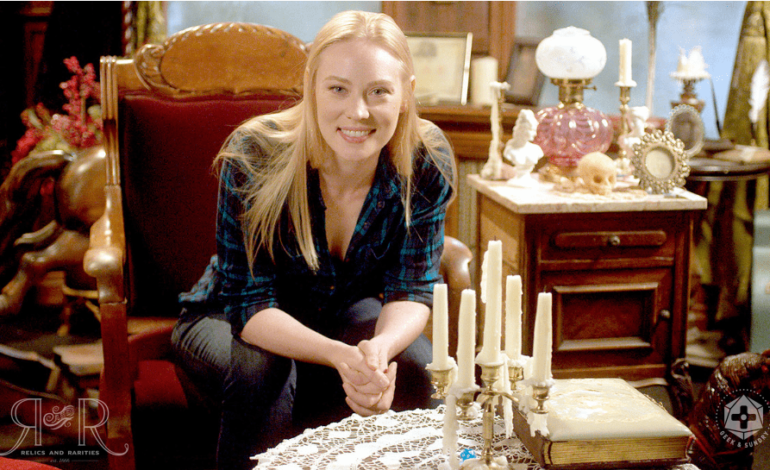

San Diego Comic-Con is a bizarre animal. Somewhere near 140,000 rabid enthusiasts of pop culture descend on San Diego’s Gaslamp Quarter swarming in myriad directions. Costumed aficionados, industry pros and general tourists all combine into a maelstrom of foot traffic. It is just a block or two away from this madness that I sit down with actress Deborah Ann Woll to have a conversation about her Geek and Sundry show Relics & Rarities, her time appearing in Marvel’s Netflix shows Daredevil, The Punisher and The Defenders, as well as acting in general.
It’s at a gaming party in a bar just outside the main Comic-Con area where we meet. Blissfully, and surprisingly, it might be the one event of the entire Comic-Con week that is modestly attended. Instead of wall-to-wall people and endless lines, a few dozen fans happily chat and enjoy free pizza. The bar for this event has an open floor plan where couches are arrayed concentrically around the main floor. This being a Geek and Sundry party, tables are stacked with board games allowing attendees the freedom to play anything they like. After Woll and I are introduced, we sit off to the side on a couch. As with anyone known for being on multiple popular television shows, it is evident that various attendees can’t help but notice her presence and try to inconspicuously look at her without staring.
Woll is instantly equal parts kind and jaw-droppingly thoughtful. Almost like an ancient tome of arcane knowledge, aching to be opened and poured through, she doesn’t even hesitate a fraction of a second between a question and each insightful reply. This year, Woll hosted, wrote, Dungeon Mastered and led the show Relics and Rarities, featuring players navigating a Dungeons & Dragons campaign. When I start the interview by explaining my own failed history with the game in my youth and how my interest in her show stems largely from the fact that it features more of the storytelling and acting that I always thought D&D would embody rather than the nonstop hack-and-slash fighting I experienced, she looks up with a twinkle in her eye and instinctively completes the thought of what the game should be. “An adventure,” she says.
Like super popular Internet show Critical Role, Relics and Rarities is an online series that features a Game Master (often in D&D referred to as a Dungeon Master) leading a team of players through an open-ended story. The players—in this case Jasmine Bhullar, Julia Dennis, Xander Jeanneret and Tommy Walker—are guided through the quest by Woll serving as the resident Game Master (GM). She defines the world, acts out additional non player characters (NPCs) and details verbally what happens after the characters dictate their actions. Occasionally, monsters are fought and dispatched through a patter of dice rolling and turn-based choices, but a lot of Relics and Rarities features narration and on-the-spot improvisational acting. Woll excels at describing the challenges and creating in-game puzzles and riddles for the players to decipher. I inquire if she was trained by someone how to balance the flow of a D&D game and make such impressive puzzles by someone when she first learned how to play the game herself.
“No, it’s not how I was trained,” she says. “My first GM, who is the only game master I ever played with consistently, he is not a puzzle person necessarily. He was playing with newbies and I think he was just trying to get us interested and involved. I asked him specifically to [teach us how to play].”
Each of the series’ first six episodes featured a celebrity guest. The six episodes ultimately amounted to about twelve hours of story, a mini saga all its own. It took time to craft all this in preparation for the show. “[There was] a month of play testing, probably a month and a half of writing,” she says reflectively. “And then, probably a month of them, they were working simultaneously, but in terms of making props and sets things like that. We had probably about a month of time after I was pretty much done writing to finish all of that.”
This elaborate undertaking still left a ton of material unexplored. Given how there’s no way to control how players in a D&D game will choose to explore, many options that are possible are never ultimately approached. Woll indicates about “45%” of the material she wrote was never explored by the players. “There’s a ton of material that we didn’t get to,” she states happily. “But I like doing that. I like sometimes creating an adventure thread where I’m like, ‘Okay, there’s room for three encounters before the final one. We’ll see how long it takes you.’ And I can always pull those and then the next door leads to that room instead of the next room.”
Nothing is lost though. This unexplored material can be re-explored in a later story. “If I don’t get to use something I get to use it again later,” she explains. “It isn’t lost forever…There’s a lot of material that isn’t used. Also because R&R [Relics & Rarities] is a one shot, they tend to be in closed environments, which is similar to a computer game. You only have a house to explore or a dungeon or a path on a wood or a submarine. It’s an enclosed space. They have complete freedom once they get there within the space but it does keep them a bit on track.” The one overarching understanding involved the players being invested in pursuing the mission laid before them. “I told the players, ‘You can do whatever you want, just stay on quest,’” she recalls. “’So whatever character you build, they can be evil, good, whatever you want them to be. The common goal of the group needs to somehow be motivated to complete the quest.’ As long as you can do that then, we’ll get along.”
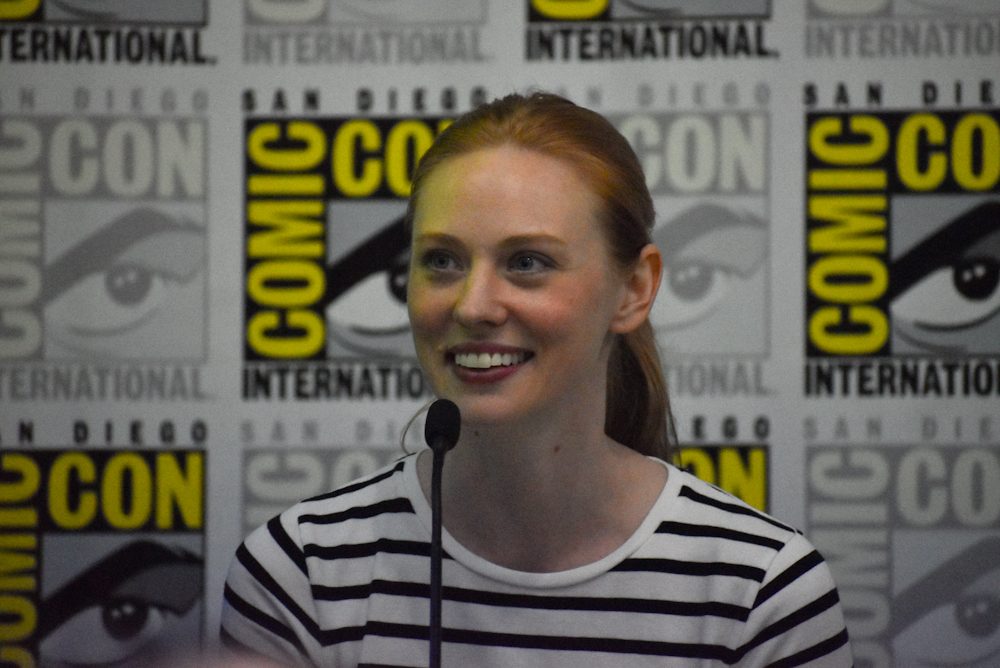

For Woll though, there is more to being a Game Master than just an implicit understanding. There’s a subtle craft of creating a story that provokes the players to want to participate. “I also try to give people, ‘Here are three quests,’” she continues. “So you get three hooks. Now, you can pick which hook you want to go to, and I have prepared for that for all three of them. And we’ll come back to the other ones. But some of that is also: your hook has to be good. Maybe they’re not going into the dungeon because they’re not excited about what’s in the dungeon.”
For Woll, enticing the player comes down to what alluring mechanisms she employs. “Some of is it about, ‘What can I put in that dungeon? Can it apply to everybody?’” she explains. “Can I say, ‘One: this is an old dungeon and there are treasures that are buried there for centuries.’ So anybody that’s motivated by that is good to go. ‘And [two:] a little girl is missing. We are afraid she has wandered into this dungeon.’ So if you’re motivated by that… and finally, ‘[three:] there’s a long-lost artifact that will help vanquish the terrible villain’ that I want you to beat in four episodes.”
“So yeah, you bait that hook really well I think,” she concludes. “And you bait it in a myriad of ways so people are excited about going there. But I also do want to throw a lot of credit onto those players. They were so on board to be on quest and understand that, ‘We are playing an adventuring company. The point is, we have a mission.’”
Warning: some spoilers ahead for readers that have not watched the full Relics and Rarities series.
In the game of Dungeons and Dragons, staying alive is not assured. Many of the fighting mechanics can come down to die rolls, but also, the players might plow their characters forward in hubris assuming they’re stronger than the threat the DM has planned. In the penultimate episode of the show, Dennis’ character Annabella is killed after the players get caught totally unawares by a high-level adversary, a death knight. The somewhat undead opponent lobs a giant orb of fire at the characters and the four players and celebrity guest Kevin Smith look on in total shock as Woll rolls dice after dice to determine how much damage they take. As the story unfolds, Jeanneret’s character Rikki Huckster brings Annabella back to life through some magic and a carefully crafted potion, but if a character stays dead, what does that mean for the players on the show? Are they killed off Game of Thrones-style never to be seen again? Is there a plan so they can continue on in some other way?
“So there was a plan when Annabella died [at] the end of Kevin Smith’s episode,” Woll explains. “I knew that was going to be a devastating moment. It was meant to be. It was meant to knock them off their pedestal a little bit. I had minions, I literally placed 4E (Fourth Edition) minions outside of that corridor so they could just hack and slash, killing things with one hit. They were spending spell slots. Out of the fun of it, exhausted all their stuff. They were like, ‘This is our battle.’ Having no idea the freakin’ death knight was going to come and rain fire from above. I caught them in a little tiny room.”
“I had a feeling….” Woll says pausing to consider her words. “The point was for them to get severely knocked down. I had a feeling someone, or others may die. The idea was always: if someone died, they would come back as a resistance member in the final episode. They had those five NPC resistance members. They could presumably take over one of those parts and be a resistance member that travels with everybody into the caves.” The saving grace appears to have been Jeanneret’s planning ahead. “Now because Xander is Xander and had spent the entire series of his own accord collecting bits and pieces, hoarding pieces,” she continues. “After the first episode he said to me, ‘I want to collect a little bit and then maybe right before the final episode make a potion or something that’s useful for us.’ I said, ‘Oh great, I like that. Let’s think about some things that might be useful.’ And then Annabella died and he and I locked eyes. I had to give it to him, because he had done that. He had actually prepared for something he didn’t know he would need to prepare for. And some people might say that was soft. I think I was rewarding the incredible ingenuity of a character and player. I allowed it. For me, you could come back as another character.”
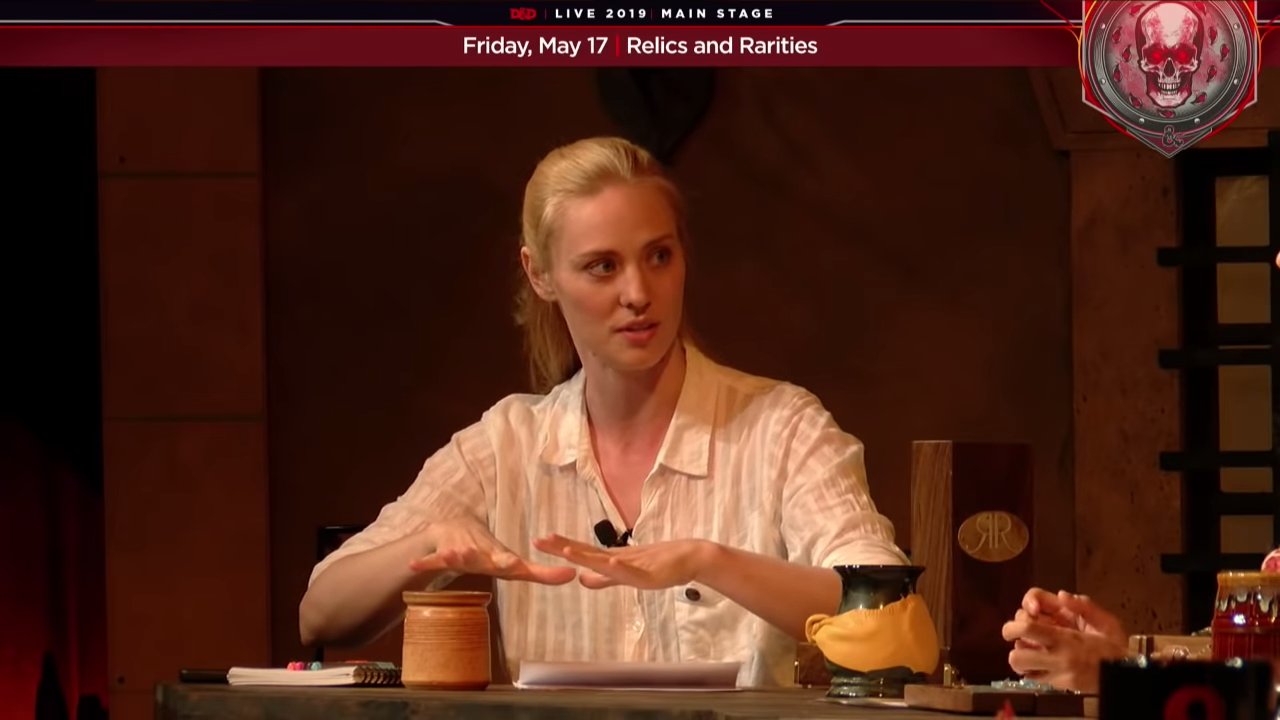

But it seems minus that one bit of ingenuity on the part of Jeanneret collecting potion components, that Dennis’ character would have truly been dead. When I state hearing all this that she is definitely not precious about protecting her player’s characters Woll says conclusively, “No. No. No. No. Annabella was dead if Xander hadn’t done that.” That being said, there may have been a way to keep Dennis on the show even if her character had perished. “Who knows?” Woll ponders aloud. “We could’ve decided that as a resistance member she was oppressed by them and wanted to join the group. If she didn’t like that character because obviously it was one I built specifically for that world, we could’ve just built her something else. That’s the nice thing about the adventuring, company party idea. They [Geek and Sundry] wanted to do this with guest stars. And I was like, ‘Well I don’t just want people disappearing and reappearing each episode.’ So this made logical sense that they would hire someone new to join them, so I could use that for the same [purpose] for the main characters.”
There’s good news and bad news for fans of the show. The bad news is the show (at least as of press time) has not been officially renewed for a second season. “We haven’t been, like, canceled, but there’s been no word about doing it anymore,” she says when asked if the show has been picked up for a second season. On the other hand the good news is, if it is renewed Woll is already ready for the second season. “I’ve already written it,” she states confidently. “I’ve outlined it. I outlined twelve adventures because I had that many ideas. T.J. (Rotell) had said something about wanting to do twelve so I was like, ‘Great. I’m going to work on that.’” Woll seems optimistic about the future but is ultimately unworried. “I would love to do more,” she says. “And frankly, even if we don’t get to do it again with Geek and Sundry or in that kind of arena, I can do it at home for free. I can just invite my friends over to my house and we’ll play Relics and Rarities.”
She even goes a step further, explaining why she would like for the show to continue, tying it to the wonderful collaborative, creative spirit of the game itself. “I would love to,” she states. “I would really, really love to. We had a little pre-game where I ran just a really short adventure for them the Friday night before we shot on Monday. Just to see how it all went. And the chemistry was so instant between the four of them. I think we all kind of looked at each other. We just want to bottle this lightning and hold onto it for Monday. And they were fantastic. They were so welcoming to the guests, so many of whom had never played DnD [Dungeons and Dragons] before. Four of them had never rolled dice at a table.” She points out one of the impressive guest appearances is what solidified this. While guest starring on Relics and Rarities, Kevin Smith played a character named Sam Hain that was from the half-human, half-devil D&D Tiefling race. “I think Kevin Smith is actually one of the greatest examples of someone who has no idea how to play DnD being an amazing DnD player,” she offers. “He made up this thing, Tiefling Traders in Bellbrook. And I was like, ‘Great. Sure. That exists. Why not.’ And now it’s a part of my canon. Now Bellbrook has a Tiefling Traders because he said so. That’s one of the wonderful things about DnD. We all just add little bits to it.”
Since Woll performs all the non-player characters in each episode, I inquire if having full reign to define so many performances is liberating compared to the television and film acting jobs she’s done in the past. “I’ll say this: I think I’m a good actor,” she says. “I think that I ask for what I want in making the character. For the most part producers and people that I work with have been very, very open to ideas.” Woll finds it thrilling creating the larger thread of the story, rather than filling in just one part. “What’s given to you, once it’s it in your hands, you get to make it whatever you want to,” she adds. “So I haven’t felt hamstrung in any way by those parts. However, as an actor, just based on what it is, you’re a brick in the wall. You try to be the strongest, most interesting brick that you can be. But Relics is the first time I designed the wall and I helped build it. Maybe someone else was making the brick and I can say, ‘Oh, that’s great. Now put grooves on the side. Go fit it into the wall.’ It’s a really fun chance to be there from the start. To be specific and enthusiastic about it and then go see all of these other creative people make stuff that slots in perfectly.”
“That’s an addicting experience,” Woll says with an exhilarated look in her eyes. “Something that I think I have been missing that I didn’t know that I wanted until I did this project.” It would seem like a logical extension for her to try out directing, but Woll says she has no desire to get behind the camera. “I don’t want to direct,” she states without hesitation. “I don’t have an eye for it. It doesn’t interest me. I do like the idea of just creatively participating as an actor/producer or an actor/writer or something like that. Directors have to care about lighting and camera angles. I have not been able to find a way to be interested in that stuff. As an actor I’m just like, ‘I’m in a documentary. I’m going to do my thing. You capture however you want. I will totally move two inches over if that gets your shot better.’ I don’t ask for the shot. I’m not interested in those things. It doesn’t change how I do my job.” Woll is humble in her estimation of directing as a whole. “It’s really hard,” she says. “People who do it and are good at it, they deserve to be the people that are good at it. It’s a really hard thing. I wouldn’t presume to say I have that talent.”
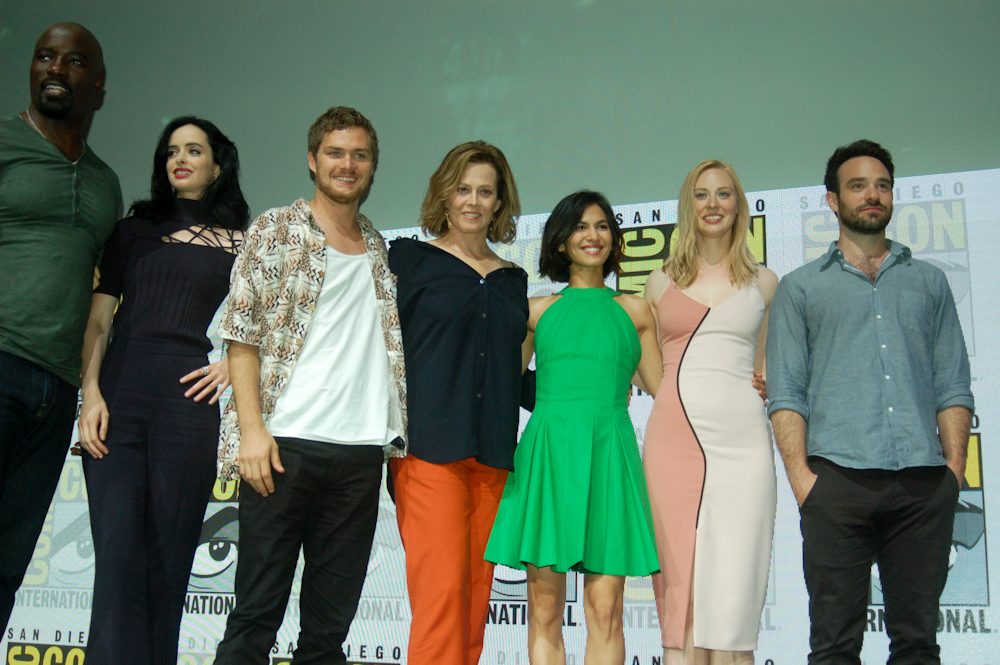

With the cast of Marvel’s The Defenders at San Diego Comic Con 2017
Most recently, prior to Relics and Rarities, Woll was one of the lead cast members on Marvel’s phenomenal adaptation of Daredevil for Netflix (prior to that, she was a main cast member for seven seasons of HBO’s wildly successful series True Blood). Daredevil had rave reviews (and allegedly large audiences; Netflix doesn’t release viewership numbers for its content) but in the midst of a giant corporate dogfight between Netflix and the soon-to-be-unveiled Disney+, the show was sadly canceled after its third season in 2018. Since its conclusion and following the shooting of the first season of Relics and Rarities, she has been trying out for other parts but is very keen to return to the theater stage. “I’m auditioning,” she says. “Theater is where I started and theater is really where I would like to return to. It’s just very, very hard to do, especially when I’ve been on a series. So much of your time is taken up. It’s very hard to slide four to five months that theater requires right into your hiatus… You might have a month and a half of rehearsal and then a four-month run. That’s five and a half months of time. That’s about as long as our hiatus is from television shows. So finding one that slots in perfectly is near impossible.”
Earlier in the day, while wandering the San Diego Convention Center in between panels, I encountered a large brigade of fans wearing homemade t-shirts sporting the slogan “SAVE DAREDEVIL.” I mention this to Woll and she’s touched and grateful, though cautious the fans’ efforts may lead to disappointment. “They’re very excited about that,” she says introspectively. “Look, I can be nothing but grateful and amazed that they were so affected by the show. I am so honored that they care about the show so much, but I just get nervous, I think the chances of it ever coming back in the same way… I mean obviously Charlie, Elden and Vincent, we all have to go get other jobs. The chances of ever having it come back together in the way that they want it to are so slim. It’s hard for me to support it just because I don’t want to give people false hope.” She pauses briefly before finishing, “I feel so terrible saying that.”
I point out that the show was not canceled due to the normal reasons of low viewership or poor reviews and Woll agrees. “It’s nothing to do with any of us, and frankly, that’s okay,” she states. “Companies are allowed to decide when they want to move on and do something else. We had three really great seasons. I’m so proud of that last season. In a way, maybe it’s great to go out with something that we’re so proud of and that had great viewership and everyone is so excited about, rather than letting it kind of peter out into this kind of thing where we no longer want to do it.” I also add how amidst many attempts at adapting Daredevil for film or TV over the years, the one she starred in might have been the first one to nail the spirit of the comics. “Everyone’s going to make these stories in whatever way feels authentic to them,” she adds. “But that’s not going to read for everyone else, necessarily. In a way, the people who read Daredevil probably when they were teenagers have now grown up into mature adults. Mature-ish, relatively speaking. I think they wanted to see content that was made for grownups that reminded them what they enjoyed about the comic book. If I can credit our showrunners and producers from the show, it is really that they captured that tone right. This can be an adult show that reminds you what it’s like to be a kid.”
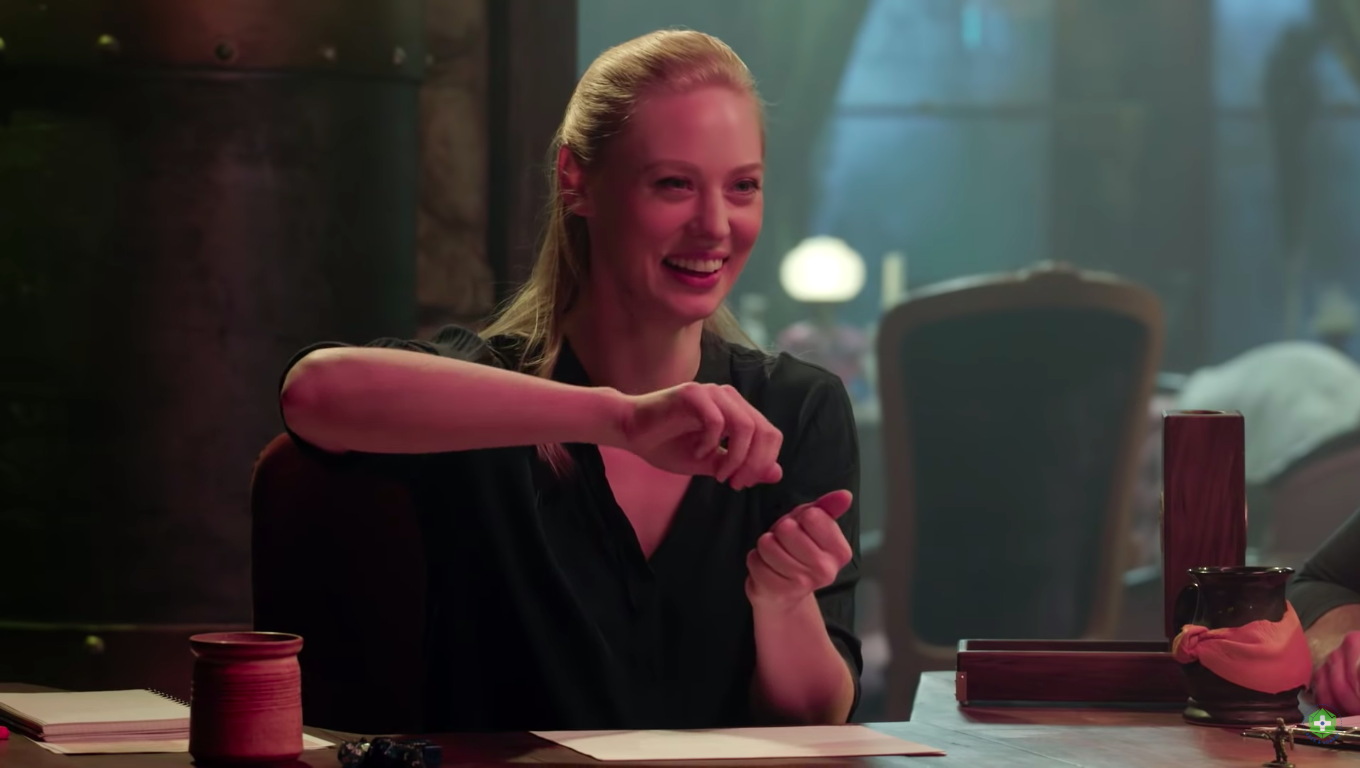

As we near the end of our conversation, I ask if there is anything in particular she’d like to do that she hasn’t already done that would be desirable to do or a fun challenge. “For me, acting–it’s always a little bit about, ‘Where are you trying to stretch? What’s a little hard for you? What’s challenging?’” she explains. “And I would say, for the last ten years, something like vulnerability and accessing those places, strength, that kind of thing was a challenge, so I really gravitated to roles that asked me to really lean into that. For me now, anger is the most difficult aspect of my personality to access. I think it’s a little bit–and not to be too gender coded about it–but I think a lot of times in the way that men haven’t been taught how to cry or how to be vulnerable in that way, women aren’t often taught how to express their anger. We’re told to sort of suppress it, or let it go, or be patient, those kinds of things.” This dynamic is what she is most interested in exploring. “I don’t always know how, when I’m angry, how to let it out in a helpful way,” she offers. “I find at the moment, I’m most attracted to roles that allow me to really play with my anger. Can I not only allow myself to be authentically moved to anger, but can I do it in front of an audience? Can I do it witnessed? Because that’s so much of the challenge of acting is: We’re used to feeling things, but we’re used to doing it in private. Holding onto it, saving it to cry alone in our rooms. As an actor if you have to cry on stage or on camera in front of millions. It’s really about being witnessed and getting comfortable with the idea of being witnessed and people not judging you.“
Woll is incredibly forthcoming about the finer nuances of her craft. When approaching any given role, she is unconcerned with whether a viewer finds her performance believable and only concerned with whether she gave an authentic performance in the moment. “I don’t really care if you think my acting is believable,” she states emphatically. “For me the only thing I know is whether I actually felt it or whether I faked it. And so I’m always striving to actually feel it. That manufacturing of emotions is not as interesting and it all exists on a chemical level. But if you can come to the place where you are strong enough and connected enough with your own mechanisms that you can have thoughts, and breathe and then feel something, that is an incredibly powerful experience. That’s what I’m addicted to. That’s what I want.”
Mainlining such automatic body reactions into performance seems like a thoroughly difficult and challenging thing to do with regularity. “Well the fact is, that’s why actors do it and normal people who are not actors don’t,” she says. “Because it’s not actually a helpful way to go through life. If you need to get to your job on time and get along with people during the day, yeah, find a different, better coping mechanism when you need to. But my job requires me to access that feeling when called upon.” She has taken to strengthening her connection to these angry feelings at home. “So I have to practice at home allowing that to happen,” she explains. “I was talking to my partner about it [and said], ‘I promise I will never yell at you.’ But it has to be okay to when I’m feeling angry to go, ‘Oh my god I’m so angry.’ And just, it’s safe. It’s a great place to practice because I know he loves me. And I know he’s not going to be scared of me… too much. [Laughs] Relatively. I can take those first scary steps in his presence more safely than I can take them elsewhere.”
This connects directly to the brain’s inability to separate its reactions from what is real and what is perceived to be real, as well as the awesome power of quality fiction. Woll chops it up on a cerebral level. “That’s the amazing thing about fiction,” she adds. “No matter who you are, whether you’re an actor or not, we can be moved by things that we know…[that are completely fake]. We watch Forrest Gump and we know those are all actors. We cry at the end when he’s talking to his son. He sends little Forrest to school and you’re in tears. And you know it’s not real, but it doesn’t matter who moves you. That’s an amazing power that we have. Our bodies don’t know it’s fiction. Our minds can be conscious about it.” From her explanation, when fully invested as an actor, the craft does sound extremely fatiguing. “So like, when you’re doing a scene, you’ll go through it, like exhausted,” she states. “‘I had a fight with my boyfriend for four hours today,’” she continues imagining recounting her day to someone. “Because in real life you do what works, with an actor you do it ten times in different angles, ten different set ups. It’s a little about that. You’re able to move through things you know you’ll come out the other side. Let’s do it. Let’s go there and come back out. Because I know I can. I practiced it coming back out. Because that’s another reason why a lot of times people hold back. They don’t want to go there. They literally say there’s a lump in their throat. That’s literally how you feel it. You put tension in your throat to hold back your emotions.” Woll challenges people to let those emotions go. “Next time that happens, just try to relieve it,” she says. “You’re going to cry. Something’s going to happen to you and it’s amazing. That is kind of acting.”
I comment about how this sounds achingly like the body’s inability to shut off the fight or flight instinct, the ingrained programming that helps us flee from imminent danger. Woll sounds positively enthused about the association. “Acting is just taking advantage of that,” she says warmly. “So I used to talk about when we’re all kids when you’re home in your bed and you hear a noise in the hall. You know mom said, ‘There are no monsters. It’s just an old house or its branches on the window.’ But it doesn’t matter. Your heart beats faster. Your palms get sweaty. Your body reacts. Acting is just doing that on purpose. It’s giving yourself those thoughts and allowing your body to react. Instead of me going, ‘Hey I’m going to stutter.’ Instead I go, ‘Maybe something scary is happening and maybe I stutter because my body responds that way.’” She finishes her larger point tying this to summoning your body’s ability to react naturally. “You do make choices in acting,” she says. “But they’re not what I think people think they are. It’s not a choice to stutter. It’s a choice to imagine the monster. And then the monster makes you stutter. You just allow your body to respond.”
To have such an enlightening conversation is a rarity. It’s not often that, as an interviewer, I come out of a chat feeling not only informed, but also inspired. Like I just participated in a master class on acting, I somehow feel several steps smarter just having been there for this conversation. Deborah Ann Woll’s answers and dissections of these topics are remarkably intriguing. It’s enough to make one want to start performing, or at the least, hop into a weekly Dungeons and Dragons game. I quip as we part company how nobody I know at this stage of life has time for a weekly campaign.
“No one wants to play make believe,” she says with a smile. “That’s why DnD is the best thing ever.”
Live photos at Comic Con By Raymond Flotat

